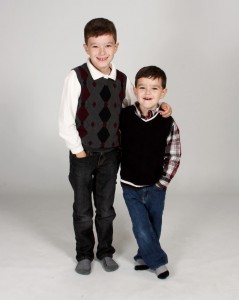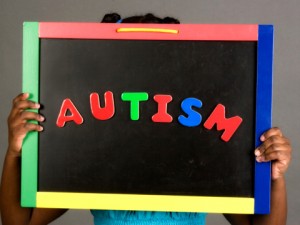I am simply amazed at how Mike has improved in social situations. Take last night for example. We went to Applebee’s to celebrate my brother-in-law’s 50th birthday; a table for 20. Applebee’s, like so many other restaurants is a busy, noisy place with big screen TVs all around and lots of clapping, happy-birthday-singing wait staff scurrying in all directions. A perfect place for a melt-down if ever there was one, and he’s had a few there in years past. I sat next to Mike, who sat next to one of his uncles; this put us near the center of this large gathering. Throughout the night Michael made many attempts to tell his newly acquired Knock-Knock Jokes:
Mike: Can I make you laugh?
Uncle Rob: Sure.
Mike: Knock knock…
Uncle Rob: Who’s there?
Mike: Jamaica
Uncle Rob: Jamaica who?
Mike: Jamaica me crazy!
Now, I know that he was surrounded by family, who know more about Autism and developmental disabilities than most, and that Mike may simply be repeating a pleasurable activity, but I see how he interacts with others, and amazed at how this compares to his lack of interaction with others just a few years ago. Fortunately or not, Mike has a younger cousin with developmental disabilities. I bring this up only to highlight in my mind and in the minds of many members of our family how far Mike has come, and it is Mike’s development that gives us and our extended family hope for the future.
He proceeded to tell this joke and another to his younger cousin as well.
Later in the evening, he accidentally spilled a glass of milk on the table, which eventually spilled on to both his brother’s and my lap. “Dad, I am so sorry. I can’t believe how clumsy I am!” His reaction and intonation were so spot on; properly emphasizing the word ‘so’. There was no anxiety, nor any withdrawal from the situattion.
I give a lot of credit to his school, the Rosemary Kennedy Center in Bellmore, NY, where he’s attended the last two and a half years, and his socialization class on Saturdays at Helping Hands Behavioral Outreach in Melville, NY where he’s been going for 5 years. Both have been instrumental in teaching and modeling appropriate behavior and have been models of consistency. Another factor which has helped him progress is his language; he is able to build upon his vocabulary. I am convinced that his ability to communicate verbally will be the only determining factor in how far he can go in school and life.
Mind you, this is only a step along the way. We still have to remind Mike to say hello and goodbye to others oftentimes, but I am confident that he’ll master those independently one day. In the meantime, when told to say goodnight at the end of the dinner, he promptly turned to the restaurant crowd, waved, and said, “Goodbye everyone!”
The kid knows how to make an exit and an impression.












